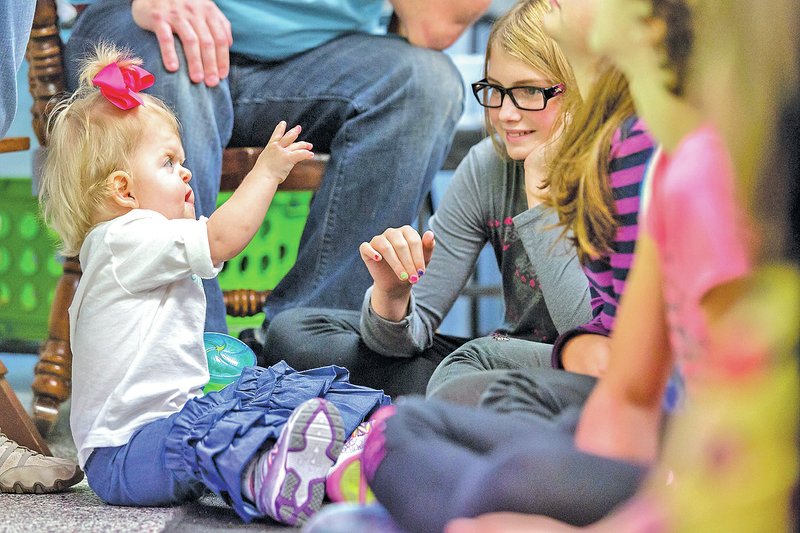ROGERS -- Fifth-graders cooed over the toddler who visited Westside Elementary School on Friday.
Their lesson was about choosing to be kind to those with physical differences. Jamie Cook, a second-grade teacher, brought her daughter, Callie Anne Cook, to school to advocate for craniofacial differences.
At A Glance
Practice Being Kind
Asking about someone who is physically different is OK, says advocate Jamie Cook. Staring and turning away is not.
Questions could include:
• May I ask you about your daughter?
• Have you had surgery? I noticed your scar.
If you don’t want to ask, smile at the people you see, she said. A smile makes a difference.
Source: Staff Report
Web Watch
Apert Syndrome
Learn more about Callie Anne and other children with Apert Syndrome online.
• The Children’s Craniofacial Association is at www.ccakids.com
• To hear more about Callie Anne’s story go to www.sweetcallieanne…
• Find Apert Owl on Facebook www.facebook.com/Ap…
September is Craniofacial Acceptance Month.
Curiosity is OK, Cook said. Rudeness is not.
"I want people to know how to respond. You have to teach that," Cook said.
Callie Anne was born with a different shape to her face and head, her mother explained to the children.
"Can you say hi?" Jamie Cook asked her 21-month-old daughter.
Callie Anne shook her head no and clasped her hands to her head.
"Oh, no," she said.
The fifth-graders dissolved into giggles.
The visit was paired with a literacy lesson. Lea Ellen Jones has been reading the book "Wonder" to her fifth-grade classes. In it, a fifth-grade boy with a severe craniofacial disorder goes to school for the first time.
The school librarian recommended the book, Jones said. Some of the children know Callie Anne because her mother teaches at the school.
The lesson is a combination of life skills and literacy, Jones said.
It isn't just about physical differences, Jones said. Everyone is different. Differences make us who we are, she said.
"They are at an age where they're trying to figure out how they fit in," she said of her fifth-graders.
Kindness is about how one interacts with others, Jones said.
Sometimes people say hurtful things to Callie Anne or point at her or stare, Cook told students. They shouldn't follow a person or stare at them. Calling names, making a grossed out face, teasing or laughing isn't kind.
Asking about differences is OK, she said. People who are different know they will catch looks, but a smile is always welcome.
"Beyond the face is a heart," Cook said.
"Different is good," one of the students seated in front of Callie Anne shouted.
When another parent whisks a child away from her daughter, it leaves her hurt, Cook said. Sometimes she'll call children over and introduce them to her.
"That's a teaching moment," Cook said.
Callie Anne's toes and fingers were fused together at birth, Cook told students. The bones were there, but they had to be surgically cut apart. The bones in her head won't grow and change like other children. Callie Anne has Apert syndrome. She has already had six surgeries, two to separate her fingers and toes and others to enlarge her skull. She will have more surgeries.
Apert syndrome is a genetic disorder characterized by the premature fusion of certain skull bones, according to the National Institutes of Health. This early fusion prevents the skull from growing normally and affects the shape of the head and face. In addition, a varied number of fingers and toes are fused together.
When she was born, the doctors were stumped, Cook told the class. Apert syndrome is rare. Only 25 children a year are born with it in the United States. There are three children in Arkansas diagnosed with Apert, Cook said.
Her son's Apert diagnosis came with a single sheet of paper, said Taryn Skees, executive director of Apert Outreach With Love. She blogs from Kentucky about their normal family life to give hope to other families, Skees said. Cook is on the Apert Owl board and runs the Facebook page. The newly formed group will raise money for care packages to help families through difficult surgeries and raise awareness among physicians. Group members are also doing school presentations like the one Cook gave Friday.
The lesson lets her give a face to what "different" can be, Cook said.
Jones said she was thrilled with the reaction the children had to Callie Anne's visit.
It's easy for a child to know they need to be kind. Actually being nice all the time when they see a person day after day, either as a friend or classmate, can be hard, Jones said.
Benjamin Montalvo, a fifth-grader, waved at the baby through the presentation. He has a brother with autism. It's hurtful when somebody asks "what's wrong with you," Benjamin said.
Fifth-grader Marco Morales said his baby brother once had a feeding tube in his nose. It isn't fair not to be nice to other people, he said.
"I learned, if you've been mean, it's not cool," said student Kimberly Amilcar.
"Just look at them as a normal kid and they are," said Cameron Roy, also a fifth-grade student.
"Be kind because everyone you meet is fighting a hard battle," Cook told students.
Even children who look like every other kid can have a battle inside, she said.
NW News on 09/13/2014
